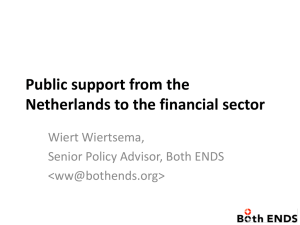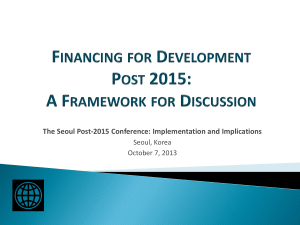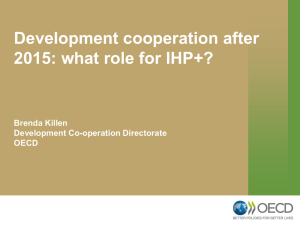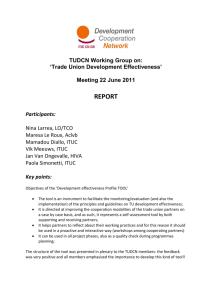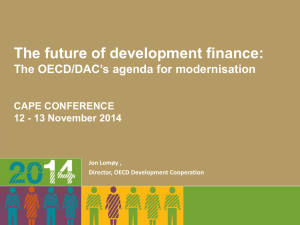The Private Sector and its role in Development
advertisement
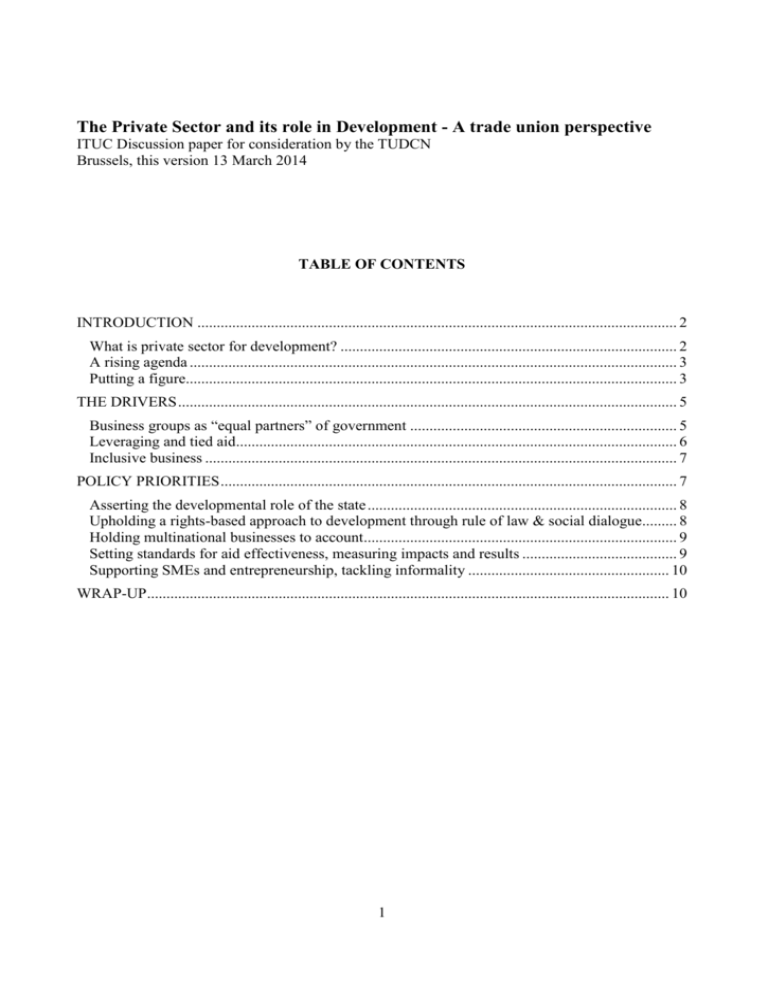
The Private Sector and its role in Development - A trade union perspective ITUC Discussion paper for consideration by the TUDCN Brussels, this version 13 March 2014 TABLE OF CONTENTS INTRODUCTION ............................................................................................................................ 2 What is private sector for development? ....................................................................................... 2 A rising agenda .............................................................................................................................. 3 Putting a figure............................................................................................................................... 3 THE DRIVERS ................................................................................................................................. 5 Business groups as “equal partners” of government ..................................................................... 5 Leveraging and tied aid.................................................................................................................. 6 Inclusive business .......................................................................................................................... 7 POLICY PRIORITIES ...................................................................................................................... 7 Asserting the developmental role of the state ................................................................................ 8 Upholding a rights-based approach to development through rule of law & social dialogue......... 8 Holding multinational businesses to account................................................................................. 9 Setting standards for aid effectiveness, measuring impacts and results ........................................ 9 Supporting SMEs and entrepreneurship, tackling informality .................................................... 10 WRAP-UP ....................................................................................................................................... 10 1 ITUC – TUDCN INTRODUCTION 1. A growing choir of voices within multilateral institutions and donor aid agencies is championing the role of the private sector in development at a time, very probably not coincidental, when Official Development Assistant (ODA) budgets are declining, the 2015 Millennium Development Goals deadline is quickly approaching and the post-2015 development cooperation agenda is taking shape. While there is no established method to measure the volume of development focused private sector initiatives it is clear that ODA targeted at the private sector for development is steadily increasing. 2. In what follows, we will attempt to provide for a stable and comprehensive definition of private sector for development (which is not necessarily an easy exercise), identify what are the relevant forums and initiatives at the international level and finally help assess the scale and volume of financing compared with “traditional” ODA. What is private sector for development? 3. Private sector for development is about the various forms of contractual engagement between a public party on the one hand – be it a public donor, another type of aid-related public institution, or a public administration – and a private party on the other – a private sector company and/or an investor – for the purpose of achieving a given development-related objective. Private sector for development can aim for a variety of objectives including, and unsurprisingly, supporting local markets and the domestic private sector, but also, and increasingly, financing and operating infrastructure as well as community and public services. 4. When that happens, the private sector company can act as: a direct recipient of public aid, including ODA, for their investments and activities (subsidies and loans); a contractor in implementing aid projects (through traditional public procurement procedures); a commercial and/or financial partner within an established public-private partnerships or through blending commercial loans with aid grants; a provider of aid-equivalent development resources (private philanthropic foundations and corporate donations); and/or a facilitator in networking and policy making processes through business forums and networks. 2 A rising agenda 5. Several international and regional forums deal with the private sector for development as a stand-alone policy area, with the Global Partnership for Effective Development Cooperation, the International Financial Institutions, regional development banks, the OECD and to some extent the G20 Process acting as the strongest champions. Likewise, at this stage in the discussions on a Post 2015 sustainable development agenda the role of the private sector is being emphasized, perhaps more so than anything else, as an essential component of a future framework. 6. These forums are different in nature and geographic scope and do not necessarily overlap with each other. There are nevertheless common features between in the design and objectives of private sector for development. They have in common: the active and perhaps uncritical support and promotion of Public Private Partnerships (PPP) financing schemes – as opposed to public procurement and to public services; a recognition of business groups as a key if not “an equal” partner in policy advocacy; a need to change the “business model” of the development cooperation and development banks so that they behave as private sector investment bankers; improving the “business climate” as a central priority while at the same time none, or very little acceptance for the effective compliance of other stakeholders’ rights, such as those laid out in the ILO core labour standards. 7. The Global Partnership for Effective Development Cooperation is holding its first “High Level Meeting” in Mexico in April 2014 to help draw lessons three years into the implementation of the 2011 High Level Forum on Aid Effectiveness in Busan, South Korea. At the time the development community committed to four “shared principles”: (i) ownership of development priorities by developing countries, (ii) effectiveness focused on results, (iii) implementation through “inclusive partnerships” and finally, (iv) accountability through greater transparency to beneficiaries and to citizens at large (noting with relevance the caveat that transparency of private sector involvement be “subject to legitimate concerns about commercially sensitive information”). 8. The outcome of the Mexico meeting might be instructive on the extent to which the above features are supported and articulated. Based on a draft proposal of final communiqué, the Mexico meeting could well highlight “business as a partner in development” and beyond that the “critical importance of promoting an enabling business environment”, the need to facilitate and promote “platforms and hubs” for structured government-business dialogue and not least to promote “the broad range of public-private partnerships”, including “innovative” public finance mechanisms that can help mitigate risk for private investors. Putting a figure 9. There is no established method to measure the volume of development focused private sector initiatives, owing in large part to the ambiguity in its definition, how it is qualified as part of ODA statistics and furthermore since not all initiatives are considered as part of ODA in the first instance. To illustrate, Australia claims that 27% of its ODA in 2012/13 is allocated to 3 ITUC – TUDCN “sustainable economic development” and Canada states that in 2009/10 22.3% of CIDA’s activities (the Canadian ODA agency) were allocated for “sustainable economic growth”. Yet, even with this type of information it is difficult to undertake any sort of comparative exercise given that the two countries’ definition of “sustainable economic development” differs substantially. 10. We can nevertheless identify broad trends. As shown in the table and graphs below, the OECD Development Assistance Committee (DAC) “creditor reporting system” indicates that ODA flows to “Economic Infrastructure & Services” projects and to “Production sectors” have grown at a much faster pace than any other sectors between 2006 and in 2012 (+137% and +118%, as compared to +43% for social infrastructure), thus corroborating the notion that ODA targeted at the private sector for development is steadily increasing. Sectoral distribution of OECD-based ODA 2006-2012 In USDbn 2006 2008 2010 2012 I. Social Infrastructure & Services 46.6 62.0 64.4 66.8 +43% II. Economic Infrastructure & Services 15.8 27.5 30.5 37.5 +137% III. Production Sectors 8.1 11.3 12.9 17.6 +118% IV. Multi-Sector / Cross-Cutting 8.7 11.9 21.0 18.9 +117% VII. Action Relating to Debt 23.2 11.3 4.9 2.9 -87% VIII. Humanitarian Aid 8.5 11.0 13.4 13.1 +54% IX. Unallocated / Unspecified 13.6 13.2 12.9 14.7 +8% Source: http://dotstat.oecd.org 200.0 180.0 IX. Unallocated / Unspecified 160.0 VIII. Humanitarian Aid 140.0 VII. Action Relating to Debt 120.0 100.0 80.0 IV. Multi-Sector / CrossCutting 60.0 III. Production Sectors 40.0 II. Economic Infrastructure & Services 20.0 0.0 I. Social Infrastructure & Services 2006 2007 2008 2009 2010 2011 2012 Source: http://dotstat.oecd.org 4 2006-2012 I. Social Infrastructure & Services II. Economic Infrastructure & Services III. Production Sectors 300 250 200 150 IV. Multi-Sector / Cross-Cutting 100 VII. Action Relating to Debt 50 VIII. Humanitarian Aid 0 2006 2007 2008 2009 2010 2011 2012 Source: http://dotstat.oecd.org THE DRIVERS 11. As discussed in the introductory part, there is no mistaking the orientation in policy circles towards a focus on the role of private sector for development. There is a clear gravitation both at the international policy setting level as well as at individual donor level. Some very important donors have fully integrated orientations towards the private sector into their development cooperation policies. 12. The question is what is behind this trend? And what are policy implications? Are we slowly but surely moving in a direction where development cooperation would be co-managed, or at least under substantial influence by business groups and their leaders? Going to the extreme, could foreign direct investment be considered as qualifying as development cooperation per se? To put it bluntly is ODA at risk of becoming privatised? In what follows we outline a number of “push factors”, or policy drivers, behind the rising agenda on private sector development. Business groups as “equal partners” of government 13. Private sector always has been a central feature of development cooperation. Many aid project aims at developing the private sector. What distinguishes the private sector for development framework from traditional ODA however is the recognition of business groups as a key if not “an equal” partner of governments and donors in policy making and project design. It is a policy 5 ITUC – TUDCN framework that clearly favours pro-business regulatory reforms in the domestic arena (cutting down on private sector regulatory requirements, trade facilitation, development of local credit and capital markets) and often a “downsizing” of the role of government (privatisation, ‘corporatisation’ of state-owned companies and administration, sector-wide de-regulation). The World Bank “Doing Business” country ranking methodology is perhaps the most well-known tool worldwide supporting pro-business reforms and is widely referenced when private sector for development is considered. And while the primary focus is on developing domestic private for profit sector, in many ways the private sector for development agenda often is closely intertwined with attracting foreign direct investment objectives and the commercial interests of multinational enterprises. 14. While improving the “business climate” is central in the narrative on private sector for development, there is very little acceptance for the effective compliance of other stakeholders’ rights (than the rights of entrepreneurs and business managers). In particular there is no recognition of social dialogue and of the role of social partners (trade unions and employer organisations) as essential foundations for project and policy making. Leveraging and tied aid 15. Another important driver in the rise of the private sector for development agenda, particularly post-2008 crisis, is the perception that the “public purse has run dry” or more specifically declining ODA flows. As public budgets are squeezed, private sector for development is portrayed as a suitable alternative form of development financing or in this case, private sector finance. Key to this line of thinking are the notions of “value for money” and of “leveraging” private finance through public support. 16. The unwavering and blind support to PPPs in developing countries – as opposed to traditional public procurement and public services – for financing infrastructure is of serious concern. In practice, PPPs have proven to be a flawed model that leads to over-priced public services, and there is much evidence to corroborate this. In contrast to traditional public procurement, experience within Europe shows that PPPs have many hidden costs and are excessively complex contracts to handle. It overlooks any possible risk associated with “blending” and in particular the possibility of situations where gains are privatised while losses socialized. 17. Another powerful ‘push’ factor explaining the increased interest in the role of the private sector in development circles is the opportunity for creating tied aid. Some donors are in fact very explicit about the link between efforts around the private sector and aid tying, despite the latter running directly contrary to the principles and commitments agreed to under the Aid and Development Effectiveness agenda. The potential that ODA public finance becomes a new and obtuse instrument for tied aid and public subsidy to OECD-based businesses operating in developing countries should be opposed. 6 Inclusive business 18. Whether a driver or a consequence, the “inclusive business” model is concomitant to the growing importance of the private sector for development agenda. Actively supported by the World Bank and, within the private sector, by the World Business Council for Sustainable Development (WBCSD), inclusive business is about unlocking the business opportunities of the poor living at the “bottom of the pyramid” to transform these people into a “financially profitable business model”. The poor themselves are depicted as consumers and sometimes as entrepreneurs or as “producers”, but rarely as workers or as employees, never as citizens. 19. It is fair to say that, at least implicitly, the inclusive business model favours privatisation processes of public services (such as education and health services). It is also very much silent on stakeholder rights. There is no reference to international norms and conventions, not least human rights and core labour standards, in stark contrast however with property and investor rights which are heralded. The WBCSD framework on inclusive business for example defines “rule of law” in a very restrictive manner: it essentially boils down to securing land tenure and property rights, as well as compliance with (private) contracts – little or nothing is said about human rights and democracy. For its part, the World Bank International Finance Cooperation (IFC) has listed a number of “regulatory hurdles” to the “business environment that are conducive to inclusive business models” and including “excessive” consumer protection legislation and loose protection of intellectual property rights, both of which would need “rethinking” as they “may unintentionally stifle” innovation. POLICY PRIORITIES 20. As discussed in this paper, private sector for development initiatives can take many forms, depending on national and local context. It would be difficult, if not impossible to propose a definitive and comprehensive understanding of its underpinnings and from there to propose a definitive positioning for the international labour movement to adopt. In some specific instances, private sector for development projects and programmes may indeed offer opportunities for trade union action. In others however, and perhaps in a majority of cases, they may pose serious concerns and threats to the rights-based approach to development cooperation as favoured by trade unions. 21. What would matter from a trade union perspective is to stay firm and defend a worker-friendly sustainable development model of growth whenever a policy debate takes place on the role of private sector in development cooperation. A number of trade union policy priorities are suggested in this chapter. 7 ITUC – TUDCN Asserting the developmental role of the state 22. One major concern trade unions have with this gravitation towards the private sector is that it undercuts the developmental role of the state and its institutions for delivering public services, for example. The very motivation that underpins private sector activity, namely its profit seeking nature, is not necessarily aligned with development objectives. Trade unions should not accept that the private sector becomes a suitable replacement to the state in delivering essential services, and as a result public finance should continue to be used to strengthen state institutions. 23. Development cooperation should sustain and reinforce the role of public administration and services in developing countries. There is a real risk that diverting scarce ODA resource private sector for development initiative would in the end help extend PPP financing and privatisations and hence weaken public services. OECD countries have committed, but so far have failed to raise ODA to 0.7% of their Gross National Income (GNI). In times of austerity-related ODA cuts, there is also a risk that any increase in support for private sector for development initiatives would end in depriving other essential traditional ODA sectors of their means. Upholding a rights-based approach to development through rule of law & social dialogue 24. If any, the narrative on private sector for development relegates rights-approaches to development, and with that human rights and labour rights as defined by the ILO, at best as a “sideshow”. As discussed in this paper, policy reforms that are most favoured are those that services private businesses and private contracting. In response, trade unions should stand firm on key principles for a rights-approach to development: rule of law and social dialogue. 25. The concept of rule of law is crucial for trade unions and for an obvious reason. The policy framework that prevail under private sector for development, and the one that guides the “inclusive business” model in particular, skews the notion of rule of law to fit it into a very narrow, free market conceptual pattern. This does not correspond to the general concept and use of the concept, which is more centred around human rights and proper administration of justice. Rule of Law is a decisive element in the fulfilment and enforceability of rights, and of rights at work in particular. Without rule of law, there can be no protection of citizens’ rights, including the fundamental rights to freedom of association and collective bargaining as outlined in the ILO Conventions n°87 & 98. 26. Social dialogue is critical for ensuring that the private sector is respecting these normative frameworks. Social dialogue helps to ensure broad based democratic ownership of economic and social development objectives, including respect for core labour standards and the promotion of social equity. Through social dialogue, employers and workers representatives contribute to shaping effective social and economic development strategies while providing effective means for conflict management and contributing to social peace. The social partners together should be recognised as development actors in their own right. 8 Holding multinational businesses to account 27. The private sector is an essential engine of growth and job creation. What matters however is that wealth created by growth is shared within society and that job creation is based on decent work principles. There is no automatic cause-effect relationship however between private sector development on the one hand and shared development and decent work creation. That is particular true in countries where rule of law is weak and where there is a deficit of social dialogue. Multinational enterprises (MNEs), from both developed and developing countries also have a role and responsibility however in delivering decent work and shared wealth creation. They must be held to account for the activities and must promote and adhere to international transparency and accountability standards in development cooperation. MNEs and their local private sector partners should respect and apply the ILO principles and labour standards and, within their operations and in their business relationships, strictly observe the requirements laid down in the United Nations Guiding Principles on Business and Human Rights – including the “Protect, Respect and Remedy” principle – the ILO Tripartite Declaration on MNEs and Social Policy and of the OECD Guidelines for MNEs. 28. Other than job creation based on decent work conditions, perhaps the prime role that private sector can have in development cooperation is to ensure that it pays its fair share of taxes. Yet, business groups continue to parrot the notion of a favourable business climate, like tax incentives. It is incoherent, if not unacceptable, to forego discussion on curbing tax evasion and “aggressive tax planning” by MNEs in the policy debate on private sector for development. Tax evasion by multinational companies in developing countries (estimated well above EUR100bn/ year) represent more than ODA. The G20-endorsed OECD Action Plan on Base Erosion and Profit Shifting (BEPS) provides for a good basis for international cooperation on tax avoidance by MNEs. But it needs to be implemented effectively. Key measures that would help meet expectations include (i) a fundamental revision of how MNEs are allowed to calculate intra-group transfer pricing (as set in the OECD Transfer Pricing Guidelines) and (ii) mandatory disclosure country-by-country tax reporting. Regarding tax evasion, enforcing automatic exchange of information between tax authorities (by opposition to exchange “upon request”) would go a long way in curbing bank and tax opacity. Setting standards for aid effectiveness, measuring impacts and results 29. If the private sector wishes to be a “partner” in development, it should live up to the effectiveness agenda especially transparency, accountability and development impact evaluation. In practical terms, private sector should fully adhere to principles of development effectiveness. The need of results measurement on the impact of private sector development programmes is essential if indeed business is to be held to account. Private sector in development should demonstratively prove the economic, social and environmental impact and contribution to economic growth and wealth creation for those segments of society that are most affected by poverty. This remains underdeveloped and is not given its due emphasis in current agenda on private sector for development. 9 ITUC – TUDCN Supporting SMEs and entrepreneurship, tackling informality 30. Incubating small and medium enterprises (SMEs) through policy space and public support is quite different than offering incentives to attract foreign direct investment though both could fall under the rubric of creating an enabling environment for the private sector. If efforts to achieve economic independence through sustainable industry it is crucial that local industries can survive and compete in global markets, and therefore need to be afforded the opportunity to “mature” to a productive efficiency and capacity to compete. 31. The importance of SMEs also stems from their role in the informal economy. While the private sector for development agenda would often favour business friendly regulatory “simplification” and cutting red tape, any such regulatory reform should first aim at tackling informality and the shadow economy. Reducing regulatory burden on business is desirable on the strict conditions that it does not impeded on stakeholders’ rights and help reduce the size of the informal sector. WRAP-UP 32. Private sector is an important engine of economic growth and wealth creation. But to be effective and benefit the people, it needs to be framed within a normative approach to development – one that guarantees rights – and a vision of governments that maintain its developmental leadership role. This is where the current agenda on private sector for development is failing to deliver. Still, and as discussed in this paper, private sector for development initiatives can take many forms, depending on national and local context. It would be difficult, if not impossible to propose a definitive and comprehensive understanding of its underpinnings and from there to propose a definitive positioning for the international labour movement to adopt. 33. What can trade unions do when they are solicited and engaged in national and international policy forums on private sector for development? This paper suggest a number of policy priorities. First, the developmental role of the state and of public authorities should asserted, and with no compromise. Second, a rights-based approach to development through human rightsbased and democracy-led rule of law & social dialogue are to be upheld. From there, the trade union voice should highlight the responsibility of multinational businesses in contributing to decent job creation and to domestic resource mobilisation (paying their fair share of taxes). Last but not least, any involvement of private sector party in a development oriented program should observe standards for aid effectiveness that apply to public parties and priority should be given to supporting SMEs and entrepreneurship and tackling informality. 10

